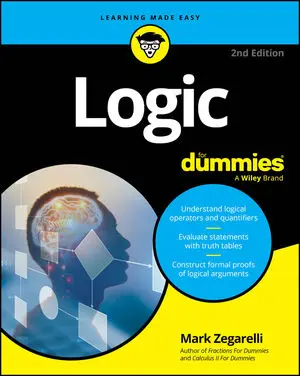Pick a number (math)
Mathematics is tailor made to use logic in all its power. In fact, logic is one of the three theoretical legs that math stands on. (The other two are set theory and number theory, if you're wondering.)Logic and math work so well together because they're both independent from reality and because they're tools that are used to help people make sense of the world. For example, reality may contain three apples or four bananas, but the ideas of three and four are abstractions, even though they're abstractions that most people take for granted.
Math is made completely of such abstractions. When these abstractions get complicated — at the level of algebra, calculus, and beyond — logic can be called on to help bring order to their complexities. Mathematical ideas, such as number, sum, fraction, and so on, are clearly defined without exceptions. That's why statements about these ideas are much easier to verify than a statement about reality, such as "people are generally good at heart" or even "all ravens are black."Fly me to the moon (science)
Science uses logic to a great advantage. Like math, science uses abstractions to make sense of reality and then applies logic to these abstractions.The sciences attempt to understand reality by:
- Reducing reality to a set of abstractions, called a model
- Working within this model to reach a conclusion
- Applying this conclusion back to reality again
The areas of science that rely most heavily on logic and math are the quantifiable sciences, such as physics, engineering, and chemistry. The qualitative sciences — biology, physiology, and medicine — use logic but with a bit less certainty. Finally, the social sciences — such as psychology, sociology, and economics — are the sciences whose models bear the least direct correlation to reality, which means they tend to rely less on pure logic.
Switch on or off (computer science)
Medicine used to be called the youngest science, but now that title has been handed over to computer science. A huge part of the success of the computer revolution rests firmly on logic.Every action your computer completes happens because of a complex structure of logical instructions. At the hardware level — the physical structure of the machine — logic is instrumental in the design of complex circuits that make the computer possible. And, at the software level — the programs that make computers useful — computer languages based on logic provide for the endless versatility that sets the computer apart from all other machines.
Tell it to the judge (law)
As with mathematics, laws exist primarily as sets of definitions: contracts, torts, felonies, intent to cause bodily harm, and so on. These concepts all come into being on paper and then are applied to specific cases and interpreted in the courts. A legal definition provides the basis for a legal argument, which is similar to a logical argument.
For example, to demonstrate copyright infringement, a plaintiff may need to show that the defendant published a certain quantity of material under his own name, for monetary or other compensation, when this writing was protected by a preexisting copyright.These criteria are similar to the premises in a logical argument: If the premises are found to be true, the conclusion — that the defendant has committed copyright infringement — must also be true.
Find the meaning of life (philosophy)
Logic had its birth in philosophy and is often still taught as an offshoot of philosophy rather than math. Aristotle invented logic as a method for comprehending the underlying structure of reason, which he saw as the motor that propelled human attempts to understand the universe in the widest possible terms.As with science, philosophy relies on models of reality to help provide explanations for what we see. Because the models are rarely mathematical, however, philosophy tends to lean more toward rhetorical logic than mathematical logic.





